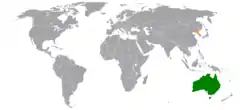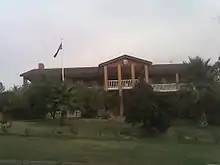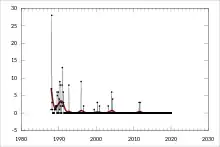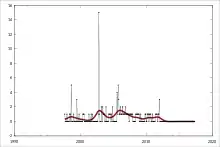Australia–North Korea relations
Australia–North Korea relations(Korean: 오스트랄리아-조선민주주의인민공화국 관계) are the current and historical bilateral relations between Australia and North Korea.
 | |
Australia |
North Korea |
|---|---|

The two countries nominally have different relations, though as of 2013 neither Australia or North Korea has an official diplomatic presence in the other country. Instead, diplomatic relations between the two are handled by non-resident embassies. The Australian embassy in Seoul manages relations with North Korea, while the DPRK embassy in Jakarta, Indonesia, is responsible for relations with Australia.[1] Additionally, the Swedish embassy in Pyongyang provides limited assistance to Australians.[2][3]
Generally the relations are stressed, due to Australia being a close ally of the United States in the Korean War and modern disputes such as over the North Korean nuclear program.
According to a 2013 BBC World Service Poll, only 7% of Australians view North Korea's influence positively, with 85% expressing a negative view.[4]
History


In 2003, in an event called Pong Su incident, the North Korean ship Pong Su was discovered in Australian waters while its crew members were smuggling heroin. The ship attempted an escape and was taken over by the Australian commandos after four days chase.
In January 2008, North Korea closed its embassy in Canberra. In January 2013, North Korea requested permission to reopen its Canberra embassy, despite Australia supporting increased international sanctions against the country due to its continued nuclear regime.[5] Australia rejected the request in June 2013.[6]
The Australian Ambassador to South Korea William Paterson took an official four-day trip in June 2016 to North Korea, which included meetings with government officials in Pyongyang as well as travelling outside the capital to inspect Australian aid-funded projects.[7]
Former Australian embassy
The Australian Embassy in Pyongyang opened on 30 April 1975 by John Watson, Resident Charge. Watson had a staff of about six, with some local employees.[8] Stephen FitzGerald, who was resident Ambassador to China, was accredited Ambassador to North Korea.[9] He presented his credentials to North Korea's vice president on 30 May 1975.[10]
The embassy was closed on 8 November 1975 following inter-governmental problems and Australian staff were withdrawn.[11] Australia did not withdraw the accreditation of its non-resident Ambassador to North Korea, but did not renew the accreditation when it changed ambassadors to China.[12] Talks on re-establishing diplomatic ties between the two countries were had in 1979,[13] and again in 1990,[14] but relations were not resumed until May 2000, and the Embassy in Seoul has been accredited to North Korea since August 2008.[15]
| Wikimedia Commons has media related to Relations of Australia and North Korea. |
References
- "Democratic People's Republic of Korea". Department of Foreign Affairs and Trade. Archived from the original on 4 April 2013. Retrieved 25 August 2013.
- "Embassies in North Korea". Everything2. Retrieved 20 July 2016.
- "Democratic People's Republic of Korea". Smart Traveller. Retrieved 20 July 2016.
- "2013 World Service Poll", BBC
- Wroe, David. "North Korea moves to open embassy in Canberra".
- "Australia says no to North Korean embassy". 5 June 2013.
- Macdonald, Hamish (29 June 2016). "Australian Ambassador to South Korea visits North Korea". NK News. Retrieved 20 July 2016.
- Cranston, Frank (31 October 1975). "N. Korean mission closed". The Canberra Times. ACT. p. 1.
- Cranston, Frank (10 August 1977). "North Korea one up in diplomacy". The Canberra Times. ACT. p. 15.
- "Credentials". The Canberra Times. ACT. 2 June 1975. p. 3.
- "Six embassy staff". The Canberra Times. ACT. 7 November 1975. p. 1.
- Cranston, Frank (3 November 1976). "North Korean post not changed". The Canberra Times. ACT. p. 10.
- "Talks begin on diplomatic ties with N. Korea". The Canberra Times. ACT. 8 August 1979. p. 8.
- "Secret talks with North Korea on relations", The Canberra Times, ACT, p. 5, 7 November 1990
- "Democratic People's Republic of Korea (North Korea)". Department of Foreign Affairs and Trade. Retrieved 10 May 2015.

